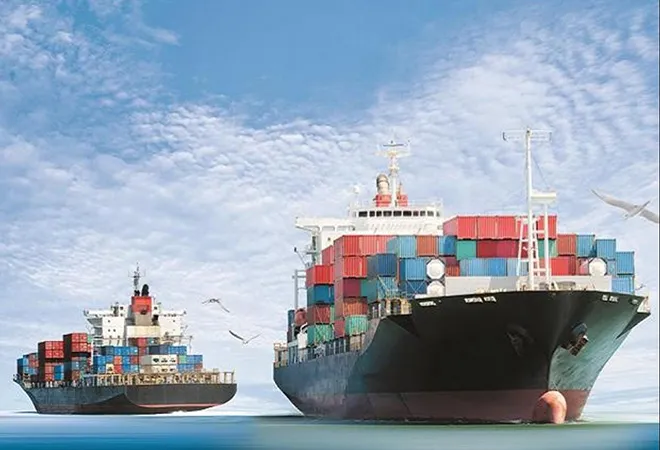
In a move that is bound to impact India’s maritime trade with Europe and other cross trades, On 15 September the European Parliament voted to include greenhouse gas (GHG) emissions from ships over 5,000 gross tonnes in its emissions trading system (EU ETS) by 2022. The billions of euros raised from the sale of carbon allowances to international shipping companies is slated to be used to support Europe’s post COVID- 19 recovery.
The actual incidence of impact on Indian shipping would be as follows. If an Indian product tanker on a voyage carrying cargo of petrol from Jamnagar goes to Livorno (Italy), part discharges cargo there and makes a voyage to Rotterdam to discharge the balance cargo. It then sails to Houston (USA) in ballast/empty ship, loads cargo there for discharge in Singapore. The proposed EU legislation requires the Indian shipping company to pay to the European authorities for the proportionate carbon emissions for its voyage legs from Jamnagar to Livorno to Rotterdam to Houston.
What is EU ETS?
Part of the policy to combat climate change, the EU ETS is the biggest emissions trading system in the world. The system sets an annual cap on the amount of GHG that can be emitted by specific energy-intensive sectors, covering up to 45 percent of EU’s emissions. As the cap is reduced over time, the cumulative permitted emissions are expected to decline each year. Within the permitted cap, the EU ETS allows companies receive free of charge or buy tradable European Emission Allowances (EEAs). Companies can also use the EEAs to buy limited amounts of international credits from emission-saving projects around the world. Priced at around €25 ($28), an EEA allows the holder to emit one tonne of GHG emissions per calendar year. This price is expected to increase as the cap on emissions reduces by 2.2 percent annually from 2021-2030. The companies are liable to pay heavy fines if they do not hold enough EEA by the end of the year.
The EU ETS would apply to non-EU flagships trading to EU ports, and levy an extraterritorial ‘tax’ on the movement of cargos on voyages originating thousands of kilometres away from Europe. Thus, besides being a questionable way of financing EU’s post-pandemic economic recovery, the unilateral extension of the ETS to international shipping also impinges on the sovereignty of non-EU states.
ETS and other freight transportation modes
While road transport is excluded from ETS because that may put extra burden directly on consumers, the EU has included intra-European aviation emissions in ETS since 2013. Fierce opposition from the US, China, India and other countries has, however, prevented the inclusion of international flights to and from Europe in the ETS. Following the decision to create a Carbon Offsetting and Reduction Scheme (CORSIA) under the aegis of the International Civil Aviation Organisation (ICAO), the EU has agreed to extend the exemption of international aviation from its ETS, at least until it can assess the merits of CORSIA (due to enter into operation in 2021).
Parallel plays in the international maritime scenario
The IMO’s Marine Environment Protection Committee (MEPC) adopted its initial strategy to reduce GHG emissions from international shipping in April 2018. Accordingly, the shipping industry is directed to (a) cut its annual GHG emissions by at least 50 percent by 2050 compared to 2008; (b) reduce the carbon intensity for the sector as a whole by 40 percent by 2030 and by 70 percent by 2050 as compared to 2008. It also identified Market-based Measures (MBMs) to incentivise GHG emissions for consideration as a mid-term measure (2023-2030). The negotiations to develop MBM for international shipping – by reconciling the UNFCCC’s motto of “Common But Differentiated Responsibility (CBDR)” and the IMO principle of “No More Favourable Treatment (NMFT)” – continued until the MEPC’s 65th meeting in May 2013 and suspended to a future session.
Jurisdictional issues: When a subset attempts to rule the whole set
Section 34 of Regulation (EU) 2015/757 on the monitoring, reporting and verification (MRV) of CO2 emissions from maritime transport, and amending Directive 2009/16/EC require all ships, irrespective of flag of registry, to annually report CO2 emissions for vessels larger than 5,000 gross tonnage (GT) calling at any EU and EFTA (Norway and Iceland) port. This regulation covers all voyages to, from and within the EU since 1 January 2018.
The IMO, on the other hand, too has adopted Data Collection System (DCS) vide Resolution MEPC.278(70) with very similar requirement of reporting of fuel oil consumption data for all vessels above 5,000 GT engaged in international voyages starting from 1 January 2019. This covers about 90 percent of the total energy consumption by international shipping.
As EU MRV has not been aligned with IMO DCS, ships making voyages to EU ports are required to report under both schemes, increasing administrative burden. Total CO2 emissions in 2018 under EU MRV added up to 138 million tonnes, approximately 18.6 percent of global emission from ships on international trade.
As emissions from international shipping are covered by international laws they should not be unilaterally included in a regional framework such as the EU ETS. Dr Martin Hedemann-Robinson, in his paper ‘Environmental Inspections and the EU: Securing an Effective Role for a Supranational Union Legal Framework’ warns that a regional group of states attempting to impose financial requirements on foreign flag ships outside the territorial waters of the states concerned to fund the EU budget “sets a worrying precedent”. Such regional actions would not only impact the international shipping sector, but may not even lead to reduction of regional or global GHG emissions from shipping. According to a study commissioned by the European Community Shipowners’ Associations (ECSA) and the International Chamber of Shipping (ICS) in July 2020, such regional action portends potentially higher risk of carbon leakage. Action by the EU, the study concluded, may result in absolute carbon emissions increasing outside the EU, because it will provide opportunities to avoid participation irrespective of the nature of the scheme.
Such unilateral regional actions also set wrong precedence for other countries and regions to follow and eventually to a more fragmented regulatory landscape, the impact of which, will be hard to contain on the global level. It cannot be forgotten that shipping is global in nature and requires global solutions.
Commercial implications
Under the EU ETS, the price of carbon will be set and dictated by the “market”, leading to unpredictability in the prices of ETS permits. Such a scenario may lead to financial speculation by large financial companies and thus compromise the real intent of benefiting the environment.
As the economic cost is unknown, commercial and financial planning of bulk shipping will be undermined. Bulk shipping is predominantly driven by privately-owned small and medium-sized operators engaged in the transportation of homogeneous dry and wet bulk cargoes on a voyage by voyage basis. The ETS will create a bureaucratic monster, increasing the administrative burden for such companies. In terms of the consumers of bulk goods, it is expected to increase the overall cost of goods.
The way forward for the government of India
The Ministry of Commerce needs to recognise the potential problems and increase in costs to Indian shipping and trade as a result of EU’s arbitrary legislation. This scheme Field Cod Field Cod therefore needs to become part of the permanent agenda in all future trade negotiations and related interactions that India has with the EU. At the same time, the Ministry of Shipping, which represents the interest of India at the IMO, needs to take up this matter urgently with the international body. The Indian National Shipowners' Association has submitted a position paper to the Ministry of Shipping to facilitate urgent engagement with IMO.
The views expressed above belong to the author(s). ORF research and analyses now available on Telegram! Click here to access our curated content — blogs, longforms and interviews.




 PREV
PREV


